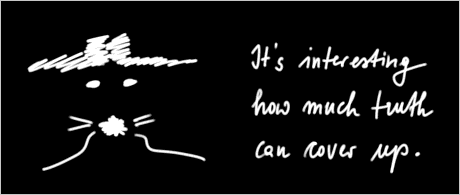Inflationary use^2
December 19th, 2006Many agree that there is inflationary use of the term sustainability. In fact, there is inflationary use of the phrase inflationary use of the term sustainability.
Many agree that there is inflationary use of the term sustainability. In fact, there is inflationary use of the phrase inflationary use of the term sustainability.

[Detective Ratta uncovering the truth that truth can cover up a lot.]
In a discussion about a failing computer and hence unmet expectations my dialog partner who — as a matter of fact — is also owner of the computer, after some time said
I think the discussion is becoming rhetorical, now.
And I couldn’t but answer:
Well, true indeed.
Those who go beneath the surface do so at their peril. (Oscar Wilde)
Even if it sounds like facts it’s still stories.
Of course, true facts always surface.
Because, lies are anything but surface.
Often, when I wake up in the morning still tired and dizzy I try to move my brain into gear by thinking about what was, what is, and what I might perhaps possibly do if I managed to get up after all. Since I do know that I really should get out of bed I confine my thinking to, you know, important issues, urgent stuff, and things that matter.
Today, I caught myself thinking that all this thinking between alarms is only my brain trying to trick myself. Actually, I realized that it’s my body who manages to get my brain to do as if it could really utilize the alarm clock’s snoozer time to the best. Like every 5 minutes thinking (half asleep) in bed is as good as 5 minutes out of bed, and getting things done (even half asleep).
Apparently, I was quite awake (or my mind is already so twisted) because I did also realize that I am a liar trying to trick myself by sincerely thinking about how my body and mind are trying to trick myself.
I have just attended a mini-conference on truth and knowledge, organized by Manfred Füllsack. Well, you know, it doesn’t take a bunch of acknowledged experts to make you know what you do not know, but then it certainly helps in some way or other.
You don’t need a weatherman
To know which way the wind blows
— Bob Dylan
In fact, I am still pondering over what I have actually been listening to. When someone articulates the need to distinguish tacit and articulated knowledge is this distinction nevertheless articulated, or is it meant to provoke the question which particular tacit knowledge it takes to draw the distinction?
Or, have I simply missed the speakers blink their Epimenidic eyes?
When Herbert Hrachovec compared the truth of knowledge with the expiry date of food might it be that the truth of his comparison had already expired at the time it has reached the audience? Thomas Auinger said this is not an issue of relativism. Quoting him: “Hier gibt es kein Relativierungsproblem.” Besides me wondering about what he was relating to, he might have been right about it if we consider the fact that the word “Relativierungsproblem” pretty much only came into existence when he used it. Or, was Herbert Hrachovec right when Thomas Auinger’s truth expired?
Of course, it’s all a question of definitions, isn’t it? (I love it!)
We have covered disfinism earlier here: The pure disfinism (of no definitions) and the eclectic disfinism (of a great many definitions). I should further extend the concept of disfinism by implicit disfinism.
Implicit disfinism is the science (or art — if you want — unless you define it) of discussing theories which try to explain the nature and scope of specific notions by use of the notions themselves without ever defining them. The little conference serves as a particularly nice example where several theories of epistemology (that’s theories of theories of knowledge) have been debated including plenty of references to truth and knowledge, shamelessly avoiding their definitions.
Thanks, guys!
